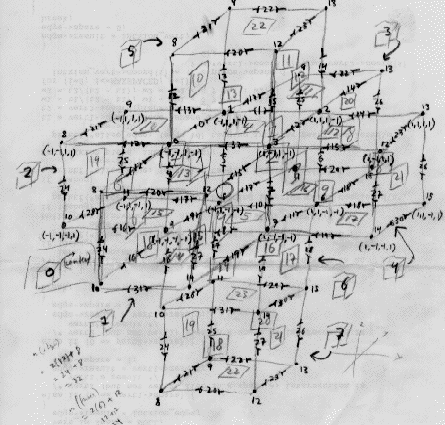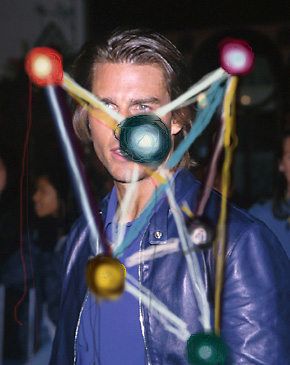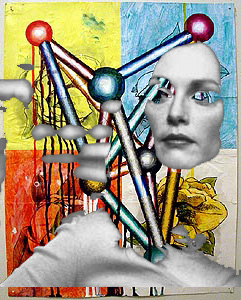View current page
...more recent posts

More imagery lifted (or re-lifted) from http://castlezzt.net, which Michael Bell-Smith found and which Paul Slocum describes as an "amazing mile long webzine thing" with the caveat that it's "probably not good for weak of computer or slow of internet." Go experience it yourself, it definitely poses a challenge to Abe Linkoln's complex net art diagram in the browser-busting department and is chockablock with interesting found (?) and concocted (?) imagery. (And did I mention that it's also juvenile and incoherent?) Rather than trying to recreate the experience here, I've just plucked out a couple of nuggets from the original maximalist context. Some nice new animations have recently been posted.

A few posts back I wrote:
Dedication to old gear and pure hacking vis a vis current proprietary software systems in some ways recalls the rock purists of yore who insisted that only black Delta blues musicians had integrity relative to British cover bands, or that 3-chord garage bands always had the edge over prog rock & fusion. This kind of essentialism has Occam's razor logic on its side but can also grow stuffy and cult-like.Modern Kicks replies here:
Point taken, and I generally agree. But with two caveats: (1) the part about 3-chord garage bands isn't really analogous to the first example, and (2) it happens to be correct. As the Mad Peck [in Creem magazine] taught us all long ago.Then I said:
Thanks for the feedback on those posts. Regarding your earlier comment, I added a parenthetical ("Was it really necessary to throw out the baby of Canterbury and electric Miles with the bilge of Kansas and Spyro Gyra?") re: the prog and fusion (or proto-fusion) I think holds up against the Pistols, etc. By "Canterbury and electric Miles" I mean Soft Machine, Tony Williams Lifetime, Can, Faust, John Cale, "Thrust"-era Herbie Hancock, Larry Coryell ca. "Live at the Village Gate," early Mothers, Fred Frith, etc etc. Also, you didn't explain what makes 3-chord rock purists different from Delta blues purists.Then MK said:
I guess my point was that prizing the integrity of black Delta blues over the British bands that covered them is to make a distinction between an original and a copy. But preferring 3-chord garage rock to prog isn't a matter of original and copy, it's choosing between two competing aesthetics. So the two comparisons work in different ways. The garage rocker doesn't dislike prog because it's a distortion of his aeshetic (as the blues aficionado does feel about, say, Led Zeppelin); he hates it because it opposes what he values.My reply to that:
I suppose one could argue that there is a similarity on the basis of a demand for some idea of authenticity on the part of the Delta blues and garage rock fan. But I'm not sure that works either. After all, many British bands insisted on attempting to maintain as high a degree of blues authenticity as possible (obviously a limited one, but nevertheless.) And garage, rather than the spontaneous expression of rock and roll it claims to be, is almost always an intellectualized, even mannered aesthetic. Not that there's anything wrong with that.
Yes, the point of similarity was (presumed) authenticity but more particularly--in the context of hackers making music vs. musicians using off-the-shelf software--the quest for a kind of musical sine qua non. Thus the reference to Occam's razor: Which is the most economical musical expression? The original or the copy? The basic or the hyper-elaborated? 1s and 0s or unnecessary proprietary code? It still seems all of a piece to me. More important, all three (blues, garage, the command line) can be cults demanding adherence to the divine orthodoxy of reduction, as against the possibility that there might actually be good British blues, good use of Reaktor, or (gasp) good prog. And the Mad Peck was wrong about Kraftwerk, they were robotoid but also funky, which is why they were playing in boomboxes all over NYC in '78, and their audiovisual minimalism was admired by many punkers.
"Groove-stricken" [mp3 removed]
[Update: Increased the volume slightly so one might be better stricken by the groove.]
"Reel for Omniverters (Final)" [mp3 removed]
"Reel for Omniverters (Beat)" [mp3 removed]
I know I keep posting this song but I'm following my original plan of adding softsynths. The so-called final version is run through an analog filter; the "beat version" is mostly a triphop-style beat with omniverter themes swirling in the background.
Double Alpen, 1995, acrylic on cereal boxes, 10" X 13" X 3"
More on failure and abuse in the digital realm, edited from a previous comment thread:
paul: I guess my point is that finding new creative ways to use software is just kinda what computer art is. Every piece of decent computer art I can think of that makes use of existing software falls into there. How can you make interesting computer art and NOT push the limits of what software was intended to do? (maybe there's a good answer to this...)
tom: I would say 99.9% of computer use to do creative work is exactly as the programmers intended, and many people consider the result art without imagining abusing their tools. Think all those hundreds of MIDI versions of pop songs, all completely obedient to the "rules." Is it "bad"? Well, yeah, most of it, but it succeeds on its own terms. This depthCore site, I don't think involves abuse on any level. They call it digital abstraction, and a lot of it's cheesy and album cover-y, but you can pick and choose and find really involved and intricate passages. Yet none of it seems to be straying outside the bounds of the programming. All that POV raytracing stuff is another example. Also some cool things there--but it's not about abuse.
[...]
paul: well anyway, I really want to abuse vocaloid.
tom: That's one I'd present straight up. It'd be hard to improve on this for sheer oddness. Another lovely, non-abusive use of the digital medium: an abstract 3-D animation set to John Coltrane's "Giant Steps" by Michal Levy (takes about a minute to load on cable, longer on dialup; hat tip to Steve)
Continuing on the subject of whether one can truly abuse digital equipment, John Parker, who makes art or experimental electro and has a very painterly approach to sound, had this comment:
A programmer for a digital instrument has to make a series of solutions to particular tasks. No matter how comprehensive the tasks, there will always be phenomena that the digital instrument makes that comes from leftfield, that was unintended, that is a 'crash'. What else could be expected from something that is made by an imperfect human being.Drx also had a follow up comment on the failure issue:
Commercial stuff is enticing for abuse because it is easy to screw with the manufacturer's original intention, [which was] to make an instrument that will appeal to a commercial market. All the interesting stuff can be found in their failings. Softsynths are a fertile resource for new digital sounds. Their many failures in trying to sound real leave behind interesting residue. Also, in a program like Reaktor, all you have to do is change parameters to unrealistic amounts or just randomly re-arrange wires to get some interesting stuff especially if it was intended to sound like a Juno 106 (that's why I like Reaktor better than MAX-MSP). Sure the sound is already there, but without a particular mindset, one would not find it.
I like your comment on failing computers. During the first shows of Bodenstandig 2000 our computers constantly crashed. The audience *always* thought this is part of the show, while we were sweating on stage to bring them back up running. For a big internet project i once did, which is changing everything you see on the web -- up to the point that the medium becomes unusable -- an estimated 99% of all users that were tested without knowing it thought that this is just the normal web.
After that i came to think that errors and crashes are just in the minds of the users and in fact in most cases you cannot distinguish a faulty and a working system. Microsoft also applies this insight in Windows XP for notifying users that a program crashed. While in earlier version you could see some honest blue screen and crazy register contents, now appears a tranquilizing dialog box saying smth like: "Powerpoint is currently in a buddhist temple. Ah, it is coming out again, see, there it is." And back comes your program, simply restarted automatically. All this on the background of a picture of grass land and clouds. k3Wl!


Magnolias 3. screenfull found the post facto pop culture reference in an art-for-art's-sake (or pseudoscience's sake) meditation. Speaking of the actor who shall remain nameless, this unfrozen caveman blogger just saw Rain Man for the first time. Cruise the auteur (whoops, I said it) stands, in movie after movie, for the thoroughly mediocre concept of the "heel who learns the healing power of love." Pardon us while we barf. In my version of Rain Man, Charlie wins the custody fight with the K-mart cracker doctor, hires his own minder and puts Dustin Hoffman on the payroll of what swiftly becomes a thriving commodity futures trading consultancy. Apropos of the freaky scene in the elevator, Cruise's girlfriend sleeps with both of them. Collectively, but only collectively, the Babbitt bros are Warren Buffett--individually they are just two dudes with problems.
